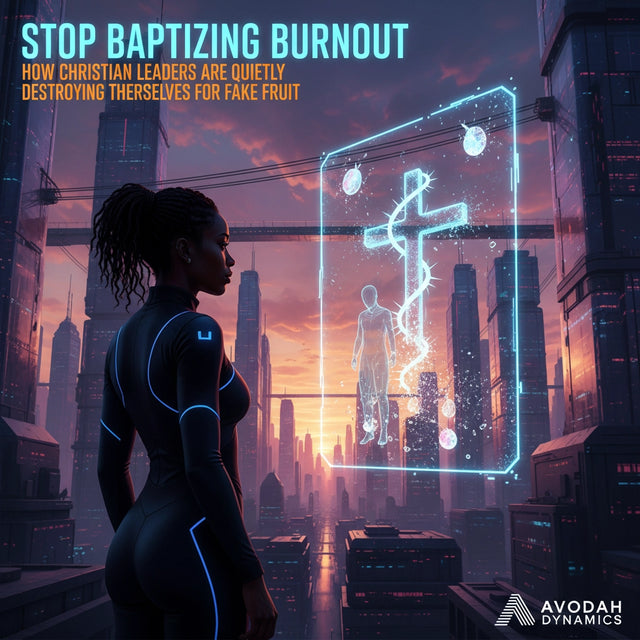Stop Baptizing Burnout: How Christian Leaders Are Quietly Destroying Themselves for Fake Fruit
We need to talk about the elephant in the sanctuary. Christian leaders are burning out at unprecedented rates, and instead of addressing the root cause, we're slapping Bible verses on exhaustion and calling it "faithfulness." We're baptizing burnout, sanctifying stress, and pursuing "fruit" that wouldn't pass a spiritual health inspection.
The statistics are staggering, but the silence is deafening. When 94% of ministry leaders experience high stress and 40% of pastors show high risk of burnout, a 400% increase since 2015, we're not dealing with isolated incidents. We're witnessing a systematic destruction of God-called leaders who've confused grinding for glory.
The Numbers Don't Lie, But We Do
Let's get brutally honest about what's happening in our churches and Christian organizations. The Evangelical Council for Financial Accountability found that 91% of Christian leaders have experienced some form of burnout. Forty-two percent of pastors have seriously considered leaving full-time ministry within the past year. These aren't just statistics, they're souls crying out for help while we hand them another conference to attend and another sermon to prep.

The most damning statistic? Fifty-seven percent of pastors report their own spiritual formation takes a back seat to other pastoral duties. Read that again. The people we trust to shepherd our spiritual lives can't find time for their own spiritual health. We've created a system where leaders are spiritually malnourished while serving spiritual food to others.
We've Confused Faithful with Frantic
Here's where it gets dangerous: we've started baptizing behaviors that would make a secular HR department call an intervention. Working 70-hour weeks isn't dedication, it's dysfunction. Skipping meals, sleep, and family time isn't sacrifice, it's spiritual suicide. But somehow, in Christian circles, we've rebranded these red flags as "taking up your cross."
The gospel never promised that faithful service would destroy your health, fracture your family, or leave you spiritually bankrupt. Yet we've created a culture where saying "no" is seen as lack of faith, where boundaries are viewed as weakness, and where burnout is worn like a badge of honor.
This isn't just wrong, it's unbiblical. Jesus modeled rhythm, retreat, and rest. He withdrew from crowds, spent time alone with the Father, and prioritized relationships over religious performance. But we've somehow concluded that following Jesus means running ourselves into the ground for causes that often produce nothing but impressive-looking spreadsheets.
The Fake Fruit Problem
Jesus warned about trees that look healthy but produce rotten fruit. Today's Christian leadership crisis reveals we've been measuring the wrong metrics. We're pursuing:
- Attendance numbers over life transformation
- Social media engagement over genuine discipleship
- Conference speaking opportunities over character development
- Organizational growth over spiritual depth
- Platform building over people caring

Real fruit, the kind Jesus talked about, includes love, joy, peace, patience, kindness, goodness, faithfulness, gentleness, and self-control. When was the last time your leadership goals included measuring these qualities in your own life? When did you last evaluate success by the peace in your home, the health of your relationships, or the depth of your personal walk with God?
Fake fruit looks impressive in reports and sounds great in fundraising letters, but it leaves leaders empty, exhausted, and spiritually starving. We're climbing ladders leaned against the wrong walls, achieving goals that God never assigned, and calling it ministry.
The Spiritualization of Suffering
Perhaps the most dangerous trend is how we've started spiritualizing obviously unhealthy patterns. We quote verses about suffering while ignoring the ones about rest. We talk about dying to self while systematically destroying the bodies and minds God gave us to steward.
"God won't give you more than you can handle" becomes an excuse to pile on more responsibilities. "Count it all joy" gets twisted into justification for accepting toxic work environments. "Take up your cross" becomes permission to carry burdens God never intended us to bear.
This isn't biblical faithfulness, it's spiritual abuse disguised as devotion. God calls us to sustainable service, not sacrificial suicide. The same God who calls us to work also commands us to rest. The same Jesus who served others also modeled boundaries, saying no to good things to stay focused on the right things.

Breaking the Cycle: Real Solutions for Real Leaders
Enough with the problem. Let's talk solutions that actually work:
1. Redefine Success Biblically Stop measuring your worth by metrics that won't matter in eternity. Success isn't about how busy you are, it's about how faithful you are to what God specifically called you to do. That calling includes caring for your own soul, health, and family.
2. Implement Non-Negotiable Rhythms Make your spiritual formation, physical health, and relationships non-negotiable appointments with yourself. If you wouldn't cancel a meeting with your biggest donor, don't cancel time with God or your family. Schedule these first, not last.
3. Practice the Power of No Every yes to one thing is a no to something else. Learn to say no to good opportunities so you can say yes to God opportunities. Your calling isn't to do everything, it's to do what God specifically assigned to you.
4. Create Accountability Systems Find people who will call out your unhealthy patterns, not celebrate them. You need friends who will ask about your soul's health, not just your ministry's growth. Board members who care about your family's wellbeing, not just organizational outcomes.
5. Model Health for Others The best leaders don't just teach healthy boundaries, they live them. Your team needs to see you taking vacations, maintaining friendships, and prioritizing your relationship with God. Leadership is caught more than taught.
The Avodah Dynamics Difference
At Avodah Dynamics, we believe authentic kingdom work flows from authentic kingdom living. You can't give what you don't have. You can't lead others to places you haven't been. Sustainable ministry requires sustainable leaders.
Our vision and core values center on developing leaders who understand that faithful service includes faithful self-care. We're not interested in creating ministry machines, we're committed to developing whole people who serve from overflow, not emptiness.

The Hebrew word "avodah" means both "work" and "worship." True kingdom work is an act of worship that honors God with both our service and our stewardship of the lives He's given us. Burnout isn't spiritual, it's the opposite. It's taking God's gift of life and systematically destroying it in the name of service.
Time for a Leadership Revolution
It's time to stop baptizing burnout and start building sustainable kingdom leaders. This means:
- Churches that measure pastoral health alongside church growth
- Organizations that prioritize leader development over organizational expansion
- Boards that ask about work-life integration, not just work performance
- Leaders who model healthy boundaries instead of heroic overcommitment
- Communities that support leader rest instead of celebrating leader exhaustion
The kingdom doesn't need more burned-out leaders producing fake fruit. It needs healthy leaders bearing authentic fruit that lasts. It needs people who understand that taking care of themselves isn't selfish, it's stewardship.
Your calling is too important to destroy in pursuit of achievements that won't matter in eternity. Your family is too valuable to sacrifice for recognition that won't last. Your relationship with God is too precious to neglect for religious performance that impresses people but doesn't honor Him.
Stop baptizing burnout. Start embracing the abundant life Jesus promised. The kingdom needs you healthy, whole, and producing real fruit that feeds souls and transforms lives.
FAQ
Q: What makes Avodah Dynamics different from other Christian lifestyle brands? A: As a faith-based Christian lifestyle brand, we focus on sustainable spiritual development that integrates authentic kingdom living with practical leadership skills, unlike brands that promote unsustainable hustle culture disguised as faith.
Q: How does Christian coaching address burnout differently than secular coaching? A: Our Christian coaching approach recognizes that true transformation comes from biblical principles of rest, rhythm, and relationship with God, not just productivity techniques found in secular coaching models.
Q: Can Christian apparel and merchandise support healthy ministry culture? A: Yes, Christian apparel that promotes messages of balance, rest, and authentic faith can help shift culture away from burnout glorification toward biblical models of sustainable service.
Q: What role does Christian music play in combating ministry burnout? A: Christian music that emphasizes God's love, grace, and the value of rest can help leaders remember their identity beyond performance, providing spiritual nourishment that secular music cannot offer.
Q: How do I know if my Christian organization promotes healthy leadership? A: Healthy Christian lifestyle brands and organizations measure leader wellbeing alongside ministry outcomes, provide resources for spiritual formation, and model sustainable work practices rather than glorifying overcommitment.




0 Comentarios
No hay comentarios todavía. Sé el primero en comentar.